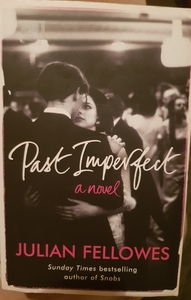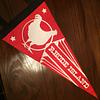Take a photo of a barcode or cover
This is starting out swimmingly! The author also wrote my recent favorite TV series, "Downton Abbey."
My thought upon finishing: in my next life I will be re-incarnated as an English aristocrat with stunning vocabulary.
My thought upon finishing: in my next life I will be re-incarnated as an English aristocrat with stunning vocabulary.
This is a type of story where the plot is less interesting than the inside look at the behaviors of the toffs and the self-made individuals who replaced them in importance after the 1960s. A fascinating look into class and culture in Great Britain and an explanation for the social rules of the peerage (basically, exclusion).
I greatly enjoyed Fellowes last novel (Snobs), so I was eagerly anticipating this one. Like Snobs (and his screenplay for Gosford Park), it's all about the subtleties of class interaction. Here, the narrator is a fringe member of the 1960s English elite, just witty and well-bred enough to get invited to country houses for the weekend, but not charismatic, good-looking, or rich enough to really rate as a player. His story alternates between the present day (where he is a single, moderately successful novelist pushing 60), and 1968 (when he participated in "the Season" -- a kind of society tour in which upper crust young men and women were thrust together in a series of formal parties and balls).
At the beginning of the book, the narrator is called to the death-bed of an staggeringly wealthy man who had been a friend at Cambridge, and who leveraged this friendship into participating in the '68 Season. In the course of that Season, the two grew apart, becoming lifelong enemies following an infamous dinner in Portugal (whose specifics are withheld until the end of the book). But, it seems that the dying man received a letter indicating that at some point soon after the '68 Season, he probably fathered a child. With no one else to turn to, he enlists his onetime friend, the narrator, to try and determine which of five women might be the mother. Thus begins a series of proxy visits to the ghosts of girlfriends past, in an attempt to uncover the possible progeny (a plot rather similar to the 2005 film Broken Flowers).
These five trips enable the narrator to spend a great deal of time reminiscing about that '68 Season, all the people involved, and the social mores that prevailed at the time. Fellowes has a keen eye for the details that make characters come alive, and when coupled with his fine understanding of interpersonal, group, and class dynamics, the Season comes alive in the book's pages. In some respects, this backward gaze is a eulogy for a bygone time, but the narrator also shows no compunction in skewering the ridiculous customs, fashions, and attitudes that dictated the lives of the young (and old) elite.
If the book has a flaw, it's that a few of the minor characters are a little broadly drawn. Several of the ex-girlfriends' husbands kind of blur together into one blustering, stupid, cruel archetype of modern men. The level of class hatred and self-loathing envy may also a little bit hard to get one's head around (at least for an American like me), but these are minor quibbles. Beyond Fellowes sharp detailing of the psychology of high-born, the book is worth reading for no other reason than to wallow in paragraph after paragraph of well-turned phrases, sly humor, and intelligence.
At the beginning of the book, the narrator is called to the death-bed of an staggeringly wealthy man who had been a friend at Cambridge, and who leveraged this friendship into participating in the '68 Season. In the course of that Season, the two grew apart, becoming lifelong enemies following an infamous dinner in Portugal (whose specifics are withheld until the end of the book). But, it seems that the dying man received a letter indicating that at some point soon after the '68 Season, he probably fathered a child. With no one else to turn to, he enlists his onetime friend, the narrator, to try and determine which of five women might be the mother. Thus begins a series of proxy visits to the ghosts of girlfriends past, in an attempt to uncover the possible progeny (a plot rather similar to the 2005 film Broken Flowers).
These five trips enable the narrator to spend a great deal of time reminiscing about that '68 Season, all the people involved, and the social mores that prevailed at the time. Fellowes has a keen eye for the details that make characters come alive, and when coupled with his fine understanding of interpersonal, group, and class dynamics, the Season comes alive in the book's pages. In some respects, this backward gaze is a eulogy for a bygone time, but the narrator also shows no compunction in skewering the ridiculous customs, fashions, and attitudes that dictated the lives of the young (and old) elite.
If the book has a flaw, it's that a few of the minor characters are a little broadly drawn. Several of the ex-girlfriends' husbands kind of blur together into one blustering, stupid, cruel archetype of modern men. The level of class hatred and self-loathing envy may also a little bit hard to get one's head around (at least for an American like me), but these are minor quibbles. Beyond Fellowes sharp detailing of the psychology of high-born, the book is worth reading for no other reason than to wallow in paragraph after paragraph of well-turned phrases, sly humor, and intelligence.
Superb writing
What an under-appreciated writer (even given the multiple Emmys and Academy award); he is extraordinarily gifted. This book was a pleasure to read.
What an under-appreciated writer (even given the multiple Emmys and Academy award); he is extraordinarily gifted. This book was a pleasure to read.
This is part social history and part novel. I enjoyed the latter tremendously, being a history buff. But the latter was a depressing account of failed hopes; and, youth eclipsed by dreary middle age with no attendant satisfactions whatsoever.
My reaction to this may be particularly American - wanting to see some sort of sunny side. A novelist friend of mine in the US was once amused to see the British edition of his book used the exact same cover art of a couple leaning against a car... Except the British publisher had altered their smiles into gloomy expressions and the sunny sky into a cloudy one.
Anyhow I got 100 or so pages into this book, and then laid it aside. I don't know if I'll finish it or not. For now I'll pop it in the guest room.
My reaction to this may be particularly American - wanting to see some sort of sunny side. A novelist friend of mine in the US was once amused to see the British edition of his book used the exact same cover art of a couple leaning against a car... Except the British publisher had altered their smiles into gloomy expressions and the sunny sky into a cloudy one.
Anyhow I got 100 or so pages into this book, and then laid it aside. I don't know if I'll finish it or not. For now I'll pop it in the guest room.
This is a type of story where the plot is less interesting than the inside look at the behaviors of the toffs and the self-made individuals who replaced them in importance after the 1960s. A fascinating look into class and culture in Great Britain and an explanation for the social rules of the peerage (basically, exclusion).
funny
lighthearted
reflective
medium-paced
Strong character development:
Yes
Loveable characters:
No
Diverse cast of characters:
No
Flaws of characters a main focus:
Yes
I went through this book very quickly and enjoyed it Alot.
The plot flits between past and present and allows for good character development. The characters are mostly likable.
It is set in "high society" which can be a bit eye rolling but it's still an enjoyable read and I'd recommend it.
The plot flits between past and present and allows for good character development. The characters are mostly likable.
It is set in "high society" which can be a bit eye rolling but it's still an enjoyable read and I'd recommend it.


